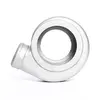Mobile:+86-311-808-126-83
Email:info@ydcastings.com
aluminum can casting
Aluminum Can Casting A Versatile Approach in Metal Fabrication
Aluminum can casting is a specialized process within the broader realm of aluminum fabrication, which has gained significant attention due to its efficiency and versatility. This technique involves pouring molten aluminum into a mold to create various forms, primarily focusing on the production of aluminum drink cans and other lightweight products. The adoption of aluminum can casting has revolutionized the beverage industry and provides a sustainable method for manufacturing.
One of the major advantages of aluminum can casting is its lightweight nature. Aluminum itself is less dense than other metals, which contributes to lighter packaging solutions. This lightness is particularly advantageous for manufacturers and consumers alike, as it reduces transportation costs and carbon footprints associated with shipping. Moreover, aluminum's excellent strength-to-weight ratio ensures that the final products remain durable while being easy to handle.
Moreover, aluminum is highly recyclable. The casting process allows for the use of recycled aluminum, which is a significant benefit considering the increasing emphasis on sustainability. Recycled aluminum requires only 5% of the energy needed to produce new aluminum from raw materials, greatly reducing the environmental impact. This makes aluminum can casting not only a cost-effective solution but also an environmentally friendly option aligned with global sustainability goals.
aluminum can casting

The casting process itself involves several steps, including melting the aluminum, pouring it into pre-formed molds, and allowing it to solidify. Advanced techniques, such as die casting, are often employed to ensure precise and high-quality shapes. Die casting allows for the production of intricate designs and tight tolerances, which are essential for modern beverage cans that require specific dimensions for filling and shipping.
In recent years, technological advancements have further enhanced the aluminum can casting process. Automation and computer-aided design (CAD) have streamlined production, significantly increasing efficiency and reducing labor costs. These innovations have enabled manufacturers to keep up with the high demand for aluminum products in various sectors, particularly in the beverage industry, which has seen substantial growth.
Additionally, the aesthetic appeal of aluminum is another factor driving its popularity. Aluminum can surfaces are not only functional – providing a barrier to light and oxygen – but also can be treated with various coatings and finishes to enhance visual attractiveness. Consumer preferences for unique designs and branding have led manufacturers to explore creative packaging solutions, making aluminum cans not just vessels for drinks but also an essential part of marketing strategies.
In summary, aluminum can casting represents a crucial aspect of modern manufacturing. Its lightweight nature, recyclability, and adaptability position it as a preferred method in the metal fabrication industry. As the demand for sustainable and efficient production processes continues to grow, aluminum can casting is likely to play an even more pivotal role in shaping the future of packaging and beyond. With ongoing innovations and an increasing focus on environmental responsibility, the future of aluminum can casting looks bright.











